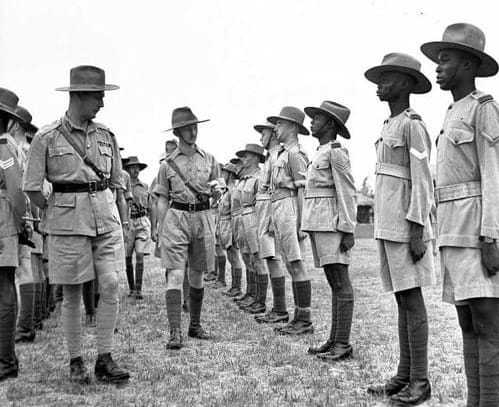Rhodesian Ingenuity
Preparations were underway in case hostilities with Vichy met with sustained opposition. Strong reinforcements were sent up to Gambia and Sierra Leone to threaten Dakar.

These movements accentuated many problems; for example, fresh meat was always difficult to obtain in Sierra Leone and Coastal shipping fully occupied the transporting of stores to Gambia so none was available for carrying cattle from Lagos to Freetown. It was particularly tantalizing because there was a surplus of cattle over the Sierra Leone and Gold Coast borders in Vichy territory.
Edgar Whitehead suggested to the Brigadier they might tap these supplies. He authorized Edgar to write to Huggins and obtain from Rhodesia a few experienced cattle 'traders' to obtain the cattle. Despite Vichy laws they expected the Africans over the border would be very ready to sell. The party of Rhodesians sent solved the problem quickly. Thousands of head of Vichy cattle flowed down from French Guinea to Sierra Leone and from Upper Volta to the Gold Coast.
Of necessity, the financing was unorthodox. Edgar had a long conference with the Command Paymaster and Financial Advisor to get their recommendations. It was finally decided to pay the expert 'traders', who were temporary military officers, a price for the cattle delivered to the R.A.S.C. depots in Sierra Leone and Gold Coast equal to what they were paying for supplies from existing sources. The 'traders' would meet all expenses and bear any losses from death en route. They were given imprest accounts as working capital, for the acquisition of the cattle over the borders, by any means they could devise. It was impossible to require detailed accounts from them but they ensured that the Army would obtain supplies of meat without any increase in costs. The R.A.S.C. accepted that the 'traders" might make a profit in return for the risks with no possibility on the Army's side of finding out what it was.
Having overcome the shortage of beef the next problem was to solve the inadequacy of tinned bacon owing to insufficient cold storage facilities. In order to provide the British troops with the traditional breakfast the General decided to start a pig farm. The Gold Coast Dept. of Agriculture was consulted and pronounced the project impossible.
The country around Achimota was infected with tsetse fly. There was no suitable foundation stock available. Once again Rhodesia was called in. Edgar wrote to Huggins to beg for a suitable pig expert who could float the project. Huggins sent a first class animal husbandry officer Ronnie Fitt, duly appointed OC Pigs with the rank of Major. With a pioneer battalion's help he quickly cleared a substantial acreage of forest while the Engineers built several hundred concrete styes. He mounted batteries of the Zululand type of tsetse fly traps and never lost a pig from trypanosomiasis!
They obtained a foundation stock from the Free French in the Cameroons where they had an acclimatized strain of Normandy pigs. There were no major feeding problems. A huge US Air Force base had been established close to Accra Airport housing some seven thousand men. S.A.B.C. sent lorries to collect the swill every morning. The Americans wasted enough food to keep several hundred sows in good health. They had no trouble with green food or roots for the pigs as the site adjoined the existing Army vegetable farm. The undertaking was a huge success. First class bacon was shipped to Freetown once the Gold Coasts demands were met. The Colonial Office Agricultural staff watched the development first with doubt, then with increasing admiration. One of them said to Edgar sadly, "You see we have all been trained as experts to advise others; none of us have ever produced anything ourselves." The farm reverted to the Gold Coast Administration after the war, as a gift from the Army, but Edgar expected it would be quickly abandoned.
Shortly after this the General invited Edgar to dine in his mess. He said, "I'm so glad that the prewar arrangement I made to bring Rhodesians to West Africa has worked out so well. I know exactly how to handle Rhodesians. First one explains exactly what needs to be done. Then one sends them out on their own to some remote part of the bush and leaves them to get on with it. The job will be done perfectly and one can forget about it. The only thing is one must never go and inspect them, if you do they will be insubordinate."
The historical novel Whitewashed Jacarandas and its sequel Full of Possibilities are both available on Amazon as paperbacks and eBooks.
Attention all Zimbabwe Readers! Hannah Rothwell of Pungwe Projects, 10 Stuart Avenue, Pomona, Harare can take book orders for Whitewashed Jacarandas and Full of Possibilities. Once Hannah places an order it is usually received from the UK within two weeks. Contact her at: PUNGWEPROJECTS@GMAIL.COM phone 0785 685 568. Find her on Facebook as Pungwe Projects or on Instagram as pungwe_projects.
The books are inspired by Diana's family's experiences in small town Southern Rhodesia after WWII.
Dr. Sunny Rubenstein and his Gentile wife, Mavourneen, along with various town characters lay bare the racial arrogance of the times, paternalistic idealism, Zionist fervor and anti-Semitism, the proper place of a wife, modernization versus hard-won ways of doing things, and treatment of endemic disease versus investment in public health. It's a roller coaster read.
References:
- Sir Edgar Whitehead's Unpublished Memoirs, Rhodes House, Bodleian Library, Oxford University, by permission.
Photo Credit:
- Forces Net. Remembering the African Soldiers who fought in Burma for the British. https://www.forces.net/services/army/remembering-african-soldiers-who-fought-burma-british
- Nigeria Stories: Recruiting the Nigerian Regiment, 82nd West African Division. https://x.com/NigeriaStories/status/1523250947438579712/photo/3

